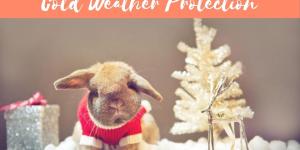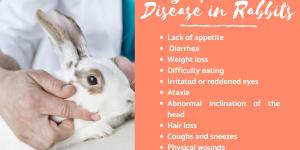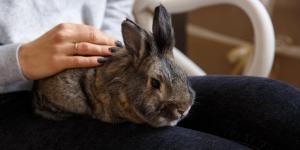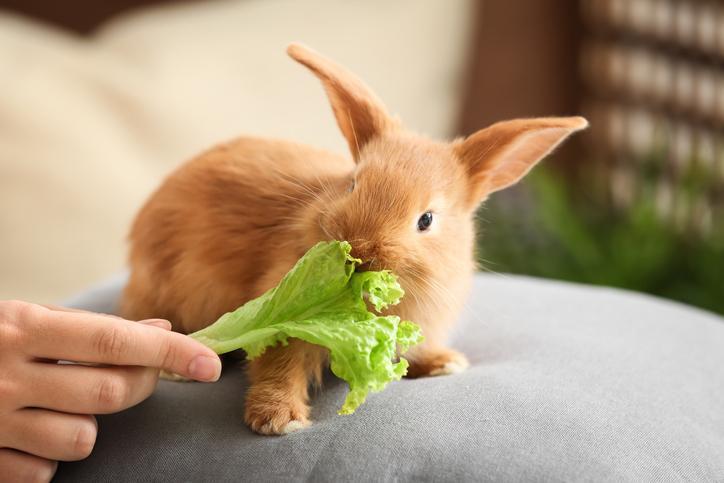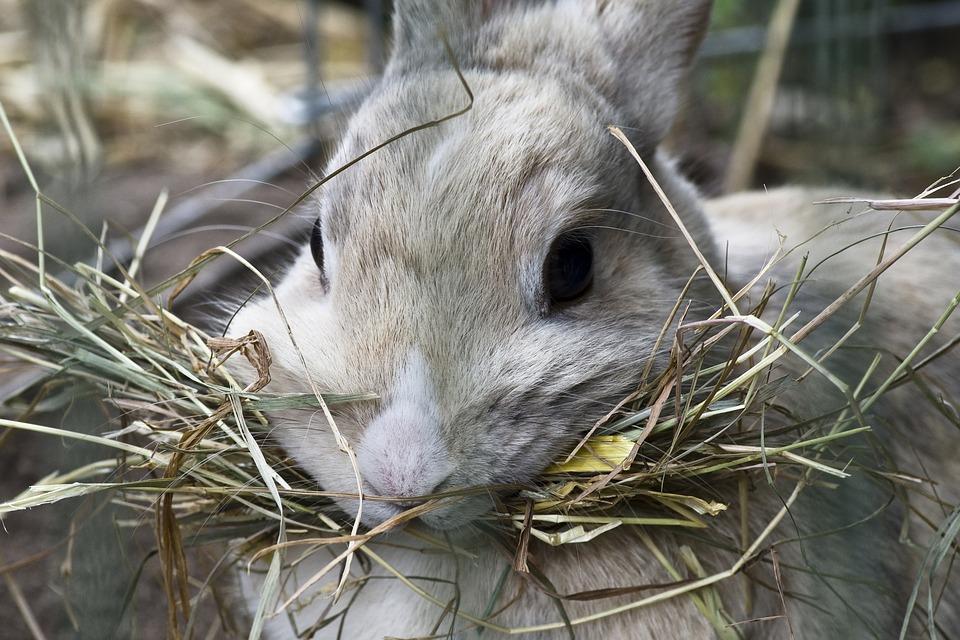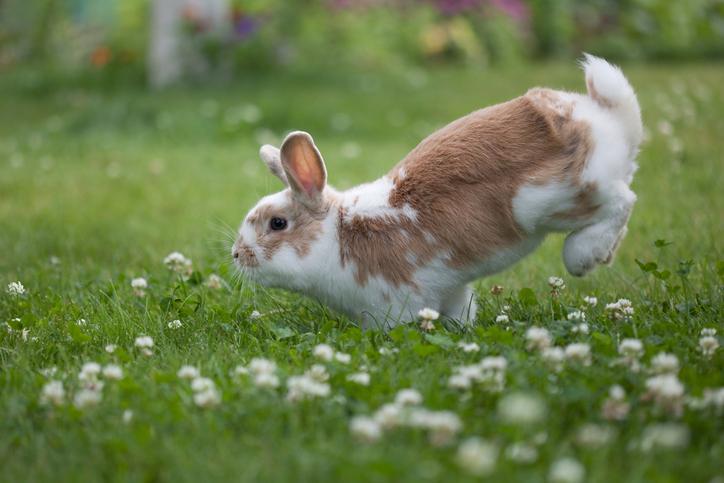Poisonous Plants for Rabbits



See files for Rabbits
Choosing a rabbit as a pet instead of a dog or cat is an increasingly common trend. These animals feed mainly on hay, combined with some fruits and vegetables, in addition to commercial feeding. The fact that rabbits are herbivores does not mean that they can eat all kinds of vegetables or plants, as they can be toxic to our rabbits. Some can be offered to a rabbit in generous portions, while others should be restricted or avoided altogether.
The following AnimalWised article describes the most poisonous plants for rabbits and what to do if you suspect your rabbit is poisoned.
What to feed my rabbit?
Poor nutrition is one of the most common reasons rabbits end up at the vet. Two of the most important health problems in rabbits are problems with the digestive tract and problems with teeth and molars. Both of these can be largely avoided by providing our rabbit with the proper diet.
The rabbit's diet should consist of three main components: Hay, fresh food and quality pellets in the following proportions:
- Hay: 80%
- Fresh food: 15%
- Pellets: 5%
Rabbits have a very sensitive digestive system that can be easily altered by the proliferation of harmful bacteria due to a sugary diet or inadequate fiber intake. For this reason, a rabbit's diet should consist of 80% hay. The daily amount of hay should be proportional to the rabbit's body volume.
Pellets can be good for rabbits in small amounts, but they are not a necessary part of a rabbit's daily dietary intake. If you give your rabbits a balanced diet of grassy hay and a variety of green leafy vegetables, they can be healthy without pellets.
Finally, it is also essential to feed your rabbit a handful of fresh herbs, leaves, or vegetables every day, as they are a source of calcium, vitamins, and nutrients that your rabbit needs.
If you want to learn more about rabbit diet and proportions, do not miss the following article, where we explain how much a rabbit should eat to stay healthy.
Fresh food for rabbits
As mentioned above, the main diet for domestic rabbits is hay, but it must be supplemented with fruits and vegetables so that their bodies get all the necessary nutrients. In the following list, you will find some useful plants and fruits you can safely feed your rabbit:
- Dandelion
- Carrot Wild mallow
- Celery
- Zucchini
- Apple
- Peppermint
- Clover
- Cucumber
- Peach
- Strawberry
- Chamomile
- Lettuce
- Chickweed Castle
- Grape
- Pumpkin
- Spinach
- Turnip
- Watercress
- Mango
- Sweet melon
Be sure to wash fresh food very well, as it was likely sprayed with pesticides when harvested, which can cause serious health problems if ingested by your rabbit.
When introducing a new food to your rabbit's diet, it is always advisable to do so gradually. Forages such as grass and flowers should be mixed in with the hay to prevent the rabbit from developing selectivity to a particular food.
Continue reading the following article to learn which vegetables are safe for rabbits.

Poisonous plants for rabbits
Vegetables, fruits, flowers, herbs, and grasses are essential for rabbits' diet. However, there are some plants and herbs that can be really dangerous for them. Knowing which plants to offer or withhold from a rabbit can make the difference between health and illness. You can prevent potential health problems by avoiding their use in the rabbit's diet and preventing them from accessing gardens or yards with these herbs.
Plants have many components, such as: leaves, seeds, flowers, roots, berries, and bark. Depending on the plant, some or all of the parts may pose a danger to rabbits. Below you will find the most dangerous plants for rabbits.
- Aconite: all aconites and related species are toxic to rabbits. They contain alkaloids that can cause severe digestive disorders and heart issues. In severe cases, even a small amount can cause the rabbit's heart to beat slower or even stop completely. All parts of the plant are poisonous and should be kept out of the reach of rabbits.
- Buttercup: all species of buttercups are poisonous to rabbits. This includes the flower, the leaves, the stem, and the roots. The good news is that they are only dangerous if consumed in large quantities. This plant causes digestive problems or inflammation in the rabbit's mouth.
- Hydrangeas: hydrangeas are very popular in gardens and balconies around the world. However, all parts of the hydrangea plant, including the leaves, buds, and flowers, are very toxic to rabbits and other animals. These plants contain large amounts of a compound called amygdalin, which produces cyanide. This substance is toxic to most mammals, but since rabbits are small, ingestion of a small amount of this plant is enough to cause complications in them.
- Chrysanthemum: one of the plants most likely to be ignored by wild animals such as deer or wild rabbits because of the strong odor and furry nature of the flowers. The toxic compound found in chrysanthemums is a high level of pyrethrins. This is also a common ingredient in insecticides. If a rabbit has been poisoned by eating this plant, it may suddenly show loss of appetite and refuse to eat. It may also suffer from lack of energy, convulsions or twitching.
- Lilies: most lily plants are toxic to rabbits to varying degrees. Some varieties can cause mild intestinal problems, while others can cause severe gastrointestinal complications. In either case, it is best to keep this plant out of the reach of rabbits.
- Onion: all plant parts from the onion family are poisonous to rabbits. Garlic also belongs to this group. Onions can cause anemia in rabbits and weaken their immune system because their continued consumption impairs red blood cell production. They also cause digestive problems.
- Poppy: the opium alkaloids contained in the poppy plant are highly toxic to rabbits. Despite the toxic components of the plant, the seeds contain the highest concentration of opium alkaloids, making them particularly lethal to rabbits. Even a dried poppy plant can be highly toxic to a rabbit.
Other toxic plants for rabbits
In addition to the plants listed above, there are many common plants that can also be toxic to rabbits, even when consumed in small amounts. The following is a list of plants that should not be consumed by rabbits, in alphabetical order:
- Asparagus
- Azalea
- Begonia
- Belladonna
- Black yarrow
- Bloodroot
- Bulbous ear
- Buxaceae
- carnation
- Cottongrass
- Cyclamen
- Daffodil
- Dahlia
- Daisy
- Devil's
- Eggplant
- Elderberry
- Eucalyptus
- Geranium
- Hyacinth
- Iris
- Ivy
- Jerusalem saffron
- Lantana
- Ligustrum
- Lupine
- Mistletoe
- Mustard
- Orchid
- Rhododendron
- Rhubarb
- Robinia
- Stramonium
- Tansy
- Tobacco
- Tulip
- Wild ivy
- Wisteria
If you want to learn more about what kind of food you should never give your rabbit, continue reading the following article about the most toxic foods for rabbits
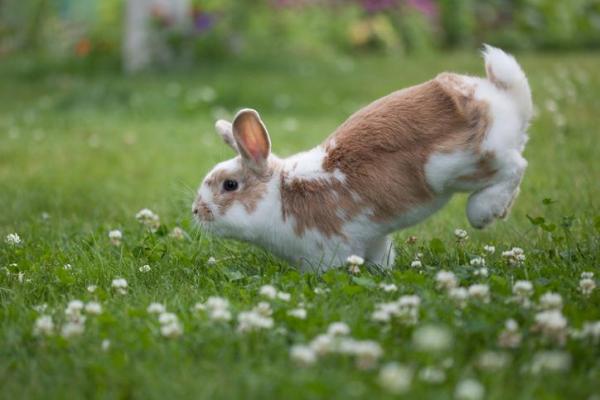
What to do if your rabbit is poisoned?
If you suspect your rabbit has been poisoned, remain calm and safely remove the source of the poison before calling your veterinarian. There are signs that can confirm that the animal has been poisoned:
- Diarrhea
- Bleeding
- Ulcers
- Wounds in the mouth
- Seizures
- Paralyzes
- Convulsions
- Tremorsand difficulty breathing
- Rash on the skin
You should not self-medicate a rabbit, as some medications can be toxic to rabbits. It is very important that you keep contaminated rabbits separate and isolated from other animals.
This article is purely informative. AnimalWised does not have the authority to prescribe any veterinary treatment or create a diagnosis. We invite you to take your pet to the veterinarian if they are suffering from any condition or pain.
If you want to read similar articles to Poisonous Plants for Rabbits, we recommend you visit our Prevention category.
- Wegler, M. (2002). Healthy and happy dwarf rabbits . Spain: European Hispanic
- Van Hoof, K. (2014). Thanks to the animals. Analysis of family livestock rearing in Latin America . Bolivia: Plural.
- Sullivan, K. (2017, March 17). "Avocado, cereal and 13 other foods you should never feed your rabbit." Peta. See: https://www.peta.org/living/animal-companions/foods-rabbits-shouldnt-eat/
- O'Neil, A. (2009). Golden tips for your rabbit . Spain: European Hispanic.

